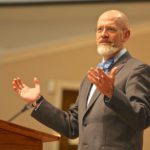I was just perusing some comments about the debate that took place in South Africa between Jonathan McLatchie and Yusuf Ismail on the Trinity in the Old Testament. Now I wasn’t able to watch it live, and might be able to slip it into the “riding queue” for next week (I do have at least one mega long ride planned), but I wanted to comment on this statement from Ijaz Ahmad, as it caught my attention:
There were quite a few fronts that the Christian side simply did not show up for, which had they been demonstrated would have been better than merely reading off as many quotes as was possible. Take for example the argument by Jonathan that Br. Yusuf’s use of Numbers 23:19 was incorrect because it was not about the character of God, but of man, foregoing that as a Trinitarian he believes that the Person of Christ was both man and God, therefore if it did speak of the Trinity (in this case the Trinitarian Person of Jesus), then he should have not denied that it referred to the character of God, unless Jonathan himself denies that the Person Of Jesus was not a divine actor with two natures. The interesting thing here is that if Jonathan does believe that God inspired the Old Testament (in whatever form), then shouldn’t God have known He would appear as a man at some point and therefore the verse’s relevance would apply then? This seems to have gone over Jonathan’s head altogether.
I have never found the use of Numbers 23:19 by Islamic apologists to be a weighty objection, but one founded more upon ignorance of the subject than upon deep reflection. Christians use this text in responding to Mormons frequently, and for good reason:
“He came to him, and behold, he was standing beside his burnt offering, and the leaders of Moab with him. And Balak said to him, “What has the LORD spoken?” Then he took up his discourse and said,
“Arise, O Balak, and hear;
Give ear to me, O son of Zippor!
“God is not a man, that He should lie,
Nor a son of man, that He should repent;
Has He said, and will He not do it?
Or has He spoken, and will He not make it good?
“Behold, I have received a command to bless;
When He has blessed, then I cannot revoke it.”
(Numbers 23:17–20 NASB)
The text comes from Balaam’s encounter with Balak and the matter of cursing or blessing the people of Israel. The issue is, obviously, the irreversibility of Yahweh’s promise to bless Israel as His covenant people in giving to them the Promised Land. Verse 19, the beginning of the word given to Balaam by Yahweh, states a basic reality: God is God. God is not human. God is the creator of humanity. This seems obvious, but Balak is undoubtedly outside the covenant community and in need of basic instruction in truth. The emphasis in pointing to the otherness of God’s nature in contrast to man is that God’s promises and blessings are not fickle, as is the case with man. Hence, immediately upon stating that God is not a man, we have “that He should lie.” Lying, being dishonest in His promises, is in the realm of fallen creatureliness; it is not something to be found in the realm of the Divine Creator. Using standard Hebrew parallelism (this is a poetic section), the same truth is restated, this time with the statement “that He should repent.”
The term used here, nacham, (the auto-correct on my computer attempted to change that to “nachos”), is deeper than the Western concept of “repent” as in “change one’s mind,” but often includes within it the idea of regret at one’s actions, or at least regret at the results of past events. In any case, the point is made plain by the rest of the verse—God has said He will bless Israel, and He will “do it” and will “make it good.” God’s revelation to Balaam cannot be changed no matter how much Balak may wish it to be so. God will not be bought off by the king’s money.
So, it is rather obvious, on any basic reading of the text in its context, that these words refer to God’s faithfulness to His promises, similar to the words of Psalm 12:6-7, for example. They are, in fact, relevant to Mormonism, which, in its orthodox historical teachings (given the nature of Mormon epistemology, all of this could change tomorrow), denies the ontological distinction between God and man. Hence, the foundation of the distinction upon which God’s word to Balaam rests, is denied in LDS theology. So, Numbers 23:19 is relevant to Mormonism, for in that religion, God and man are the same species, ontologically identical (being separated only by progression in time and status).
But the text is, rather obviously, irrelevant to the doctrine of the Trinity, and I will have to candidly admit that when I see Muslims using this text I know that their knowledge of the doctrine is, well, less than robust.
The historic doctrine of the Trinity does not teach that God’s nature is that of a man. God has eternally been God. God has never ceased to be God, and cannot by definition do so. In the Incarnation God did not cease to be God, God’s nature did not become human, etc. As I explained fairly clearly in the context of knowledgable Islamic objection in my debate with Abdullah Kunde in 2011, we believe the Second Person of the Trinity voluntarily took on a perfect human nature in the Incarnation. The Second Person did not cease being fully God, fully eternal, etc. There was no inter-mixture of the natures so that the divine became semi-human or the human became semi-divine. Two natures, one Person, “the Lord of glory” Jesus the Christ. The Word became flesh without ceasing to be the Word. The essential, eternal, unchanging nature of God did not change in the Incarnation anymore than when the Triune God brought the universe into existence. The Incarnation was a divine act in time.
The point being this: there is nothing in the statement “God is not a man” that is in any possibly logical sense relevant to the future action of the Second Person of the Trinity in taking on a human nature so as to accomplish the prophesied redemption of God’s people (Isaiah 9:5-6). God’s nature is that of God, not man—always has been, always will be. The Incarnation did not change that. Further, the point of the statement is focused upon the fallenness of man resulting in the unreliability of his promises and actions—which likewise would be irrelevant to the sinless Son when in the flesh. So any serious reflection upon the Trinity would reveal that the citation of Numbers 23:19 is errant on the part of Islamic apologists.
Now, I would likewise like to comment that I have been rather clear over the years in stating that I do not believe the Trinity is a specifically Old Testament revelation. While there are prophetic glimpses of this truth, I agree with Warfield that its primary revelation is found between the Testaments, specifically in the Incarnation of the Son and the outpouring of the Spirit. Hence, the New Testament becomes the record of this historical revelation, not the actual ground of that revelation. That is, the NT reveals the Trinity simply because it is written in light of the historical action of the Triune God that preceded it. I have addressed this in my book, The Forgotten Trinity, and you can read an excellent discussion of these issues in Warfield’s classic work, available on line here.


 Article by Dr. Michael Reeves, president and professor of theology at Union School of Theology in Oxford, England. He is author of several books, including Rejoicing in Christ, Delighting in the Trinity and Why the Reformation Still Matters. (original source
Article by Dr. Michael Reeves, president and professor of theology at Union School of Theology in Oxford, England. He is author of several books, including Rejoicing in Christ, Delighting in the Trinity and Why the Reformation Still Matters. (original source